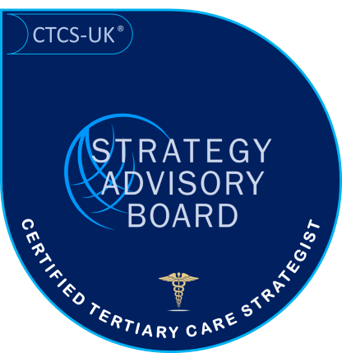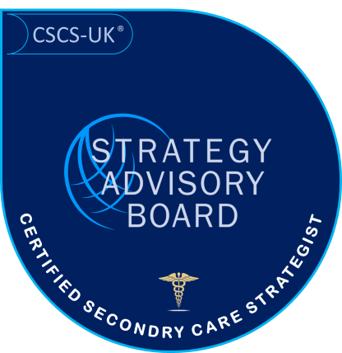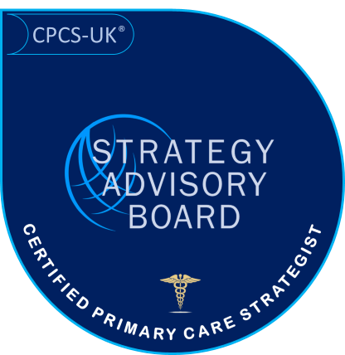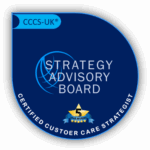WHAT IS CERTIFIED QUATERNARY HEALTHCARE STRATEGIST “CQCS-UK” CERTIFICATION?
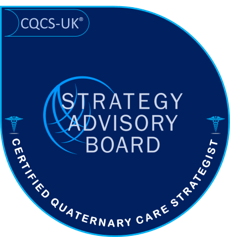
Enrollment Instructions
STEP 1: You MUST Register / Signup SIGNUP FIRST
STEP 2: Then click at the Certified Quaternary Care Strategist add it in the cart & go through Payment Process (use Discount Coupon at the Checkout)
STEP 3: After the Payment Process your Enrollment would be Completed
STEP 4: Now is the Time to Deep-dive & Learn through Lessons, Appear & Pass Certification Exams (its mix of MCQs, T &Fs and Case Scenarios)
STEP 5: Go to Dashboard (Strategy Learners Profile) Click at Certificate
STEP 6: Copy the Link of your Digital Certificate that Validates your Qualification by your Employers
STEP 7: Scroll down the Certificate for Download through Small Arrow Button for Downloading
STEP 8: Share your Qualification on Twitter, Facebook, Linkedin & Instagram
STEP 9: Apply for Board Membership APPLY NOW
STEP 10: Start Receiving Strategy Management Assignments being Open to all Board Members.
STEP 11: Get Recognised as Practicing Strategist & Board Member Strategy Advisory Board
Understand Quaternary Healthcare: Gain a comprehensive understanding of quaternary healthcare services, including specialized treatments, research integration, and academic collaboration.
Strategic Management: Develop strategic leadership skills to navigate the complexities of quaternary healthcare institutions, including resource allocation, risk management, and stakeholder engagement.
Patient Care Optimization: Learn advanced methodologies to enhance patient outcomes and satisfaction through personalized treatment plans and multidisciplinary care approaches.
Technology Integration: Explore the integration of emerging technologies, such as AI in diagnostics, precision medicine, and telemedicine, to improve operational efficiency and patient care delivery.
Ethical and Legal Considerations: Understand the ethical dilemmas and legal frameworks unique to quaternary healthcare, ensuring compliance and patient-centered care.
Research and Innovation: Foster a culture of continuous improvement and innovation through research initiatives, clinical trials, and collaboration with academic institutions.
Leadership Development: Enhance leadership capabilities to inspire teams, foster innovation, and drive organizational excellence in quaternary healthcare environments.
- Understand Quaternary Care Concepts:
- Define and explain the key principles and practices of quaternary healthcare.
- Differentiate between primary, secondary, tertiary, and quaternary care.
- Strategic Planning and Implementation:
- Develop comprehensive strategic plans for quaternary healthcare facilities.
- Implement effective strategies to enhance the delivery of complex and specialized medical services.
- Advanced Healthcare Management:
- Manage the unique operational challenges of quaternary healthcare institutions.
- Optimize the use of advanced medical technologies and treatments.
- Leadership and Decision-Making:
- Exhibit strong leadership skills tailored to high-acuity healthcare environments.
- Make informed decisions based on evidence-based practices and data analytics.
- Quality Improvement and Patient Safety:
- Design and implement quality improvement initiatives specific to quaternary care.
- Ensure high standards of patient safety and care quality in complex medical scenarios.
- Financial Acumen:
- Manage financial resources effectively, including budgeting, cost control, and financial planning.
- Understand the financial implications of advanced medical procedures and technologies.
- Regulatory and Ethical Compliance:
- Navigate the regulatory landscape governing quaternary healthcare.
- Address ethical issues and dilemmas in high-stakes medical environments.
- Healthcare Innovation and Research:
- Promote and manage healthcare innovation and research within quaternary facilities.
- Foster a culture of continuous improvement and scientific inquiry.
- Collaboration and Communication:
- Facilitate effective interdisciplinary collaboration and communication.
- Engage with stakeholders, including patients, families, healthcare professionals, and policymakers.
- Patient-Centered Care:
- Implement strategies to ensure patient-centered care in quaternary settings.
- Address the unique needs and concerns of patients requiring specialized and complex care.
- Healthcare Executives and Administrators:
- Individuals in leadership positions within healthcare organizations who oversee quaternary care services.
- Medical Directors and Clinical Leaders:
- Physicians and clinical leaders responsible for managing specialized medical departments and services.
- Healthcare Strategists and Planners:
- Professionals involved in strategic planning and implementation within quaternary healthcare facilities.
- Nursing Leaders and Managers:
- Nursing professionals who manage and coordinate care in high-acuity settings.
- Quality Improvement and Patient Safety Officers:
- Individuals focused on enhancing care quality and ensuring patient safety in complex medical environments.
- Healthcare Financial Managers:
- Financial professionals responsible for budgeting, financial planning, and resource allocation in quaternary care.
- Regulatory Compliance Officers:
- Professionals ensuring adherence to healthcare regulations and ethical standards within quaternary institutions.
- Healthcare Innovators and Researchers:
- Individuals involved in advancing healthcare innovation, research, and the implementation of new medical technologies.
- Policy Makers and Healthcare Advocates:
- Government officials, policy makers, and advocates working to shape healthcare policies affecting quaternary care.
- Healthcare Educators and Trainers:
- Educators and trainers responsible for developing and delivering educational programs in quaternary healthcare management.
- Healthcare Executive Roles:
- Chief Medical Officer (CMO): Leading the medical staff and overseeing clinical operations in hospitals and healthcare systems.
- Chief Executive Officer (CEO): Managing the overall operations and strategic direction of healthcare facilities, including hospitals specializing in quaternary care.
- Clinical Leadership Positions:
- Medical Director: Overseeing medical departments and ensuring high standards of patient care in specialized areas.
- Director of Clinical Services: Managing clinical operations and coordinating patient care across various departments.
- Administrative Leadership:
- Hospital Administrator: Leading hospital operations, including planning, organizing, and managing resources and staff.
- Director of Operations: Overseeing the operational aspects of quaternary healthcare facilities to ensure efficiency and effectiveness.
- Quality and Patient Safety:
- Director of Quality Improvement: Leading initiatives to enhance the quality of care and patient outcomes.
- Patient Safety Officer: Ensuring patient safety protocols are implemented and adhered to, reducing medical errors and enhancing care quality.
- Strategic Planning and Innovation:
- Healthcare Strategist: Developing and implementing strategic plans to enhance healthcare delivery and innovation in quaternary care settings.
- Director of Innovation: Leading the adoption and integration of advanced medical technologies and innovative practices.
- Financial Management:
- Chief Financial Officer (CFO): Managing the financial operations of healthcare organizations, including budgeting, financial planning, and resource allocation.
- Director of Finance: Overseeing financial management and ensuring the financial health of quaternary healthcare facilities.
- Regulatory and Compliance:
- Regulatory Affairs Director: Ensuring compliance with healthcare regulations and standards, managing audits, and addressing ethical concerns.
- Compliance Officer: Overseeing the adherence to regulatory requirements and ethical practices within healthcare organizations.
- Education and Training:
- Healthcare Educator: Developing and delivering educational programs and training for healthcare professionals.
- Director of Training and Development: Leading initiatives to enhance the skills and knowledge of healthcare staff, focusing on specialized quaternary care.
- Research and Development:
- Director of Research: Leading clinical research initiatives and fostering a culture of scientific inquiry and innovation.
- Clinical Research Manager: Overseeing clinical trials and research projects aimed at advancing medical knowledge and treatments.
- Policy and Advocacy:
- Healthcare Policy Advisor: Advising on healthcare policies and regulations, focusing on improving quaternary care services.
- Health Advocate: Working with government and non-government organizations to advocate for policies that enhance quaternary healthcare.
- Consulting:
- Healthcare Consultant: Providing expert advice to healthcare organizations on improving operations, strategic planning, and implementing best practices in quaternary care.
- Management Consultant: Assisting healthcare facilities in optimizing their management processes and achieving their strategic goals.
Curriculum
- 8 Sections
- 24 Lessons
- Lifetime
- Module 1: Introduction to Quaternary Healthcare3
- Module 2: Strategic Management in Quaternary Healthcare3
- Module 3: Patient Care Optimization5
- Module 4: Healthcare Technology and Innovation3
- Module 5: Healthcare Ethical and Legal Frameworks3
- Module 6: Healthcare Research and Clinical Trials3
- Module 7: Leadership in Quaternary Healthcare4
- Final Exam to be CQCS-UK1













